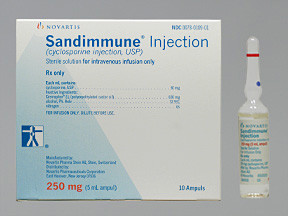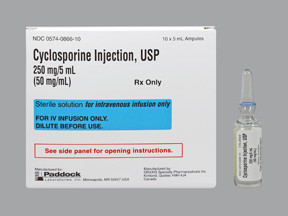CYCLOSPORINE - INTRAVENOUS
PHONETIC PRONUNCIATION: (SYE-kloe-SPOR-in)
COMMON BRAND NAME(S): Sandimmune
GENERIC NAME(S): cyclosporine
Uses
USES: Cyclosporine is used to prevent organ rejection in people who have received a liver, kidney, or heart transplant. It is usually used along with other medications to allow your new organ to function normally. Cyclosporine belongs to a class of drugs known as immunosuppressants. It works by weakening the immune system to help your body accept the new organ as if it were your own. Because of the risk of severe allergic reactions from intravenous cyclosporine, it should only be used by patients who are unable to take cyclosporine by mouth. Once you are able to take medications by mouth, you should be switched from this form of cyclosporine to either the capsules or oral solution.
How to use CYCLOSPORINE - INTRAVENOUS
HOW TO USE: This medication is given by injection into a vein as directed by your doctor, usually once daily over 2 to 6 hours. The dosage is based on your weight, medical condition, lab tests, and response to treatment. If you are using this medication at home, learn all preparation and usage instructions from your health care professional. Before using, check this product visually for particles or discoloration. If either is present, do not use the liquid. Learn how to store and discard medical supplies safely. When cyclosporine is given into a vein, one of the other ingredients in this product (polyoxyethylated castor oil) may rarely cause a serious allergic reaction. If you are using this medication at home, be prepared to self-treat as directed by your doctor if symptoms of an allergic reaction occur. (See also Side Effects section.) Use this medication regularly to get the most benefit from it. To help you remember, use it at the same time each day.
Side Effects
Precautions
Interactions
Overdose
Images
Reviews
Faq for CYCLOSPORINE - INTRAVENOUS
Cyclosporine intravenous is used to prevent organ rejection in patients who have received a kidney, liver, or heart transplant.
Cyclosporine intravenous works by suppressing the immune system, which helps prevent the body from rejecting the transplanted organ.
Common side effects of cyclosporine intravenous may include headache, nausea, vomiting, diarrhea, high blood pressure, and increased hair growth.
Cyclosporine intravenous is usually given by a healthcare professional through a vein (intravenously) over a period of time.
It is important to avoid grapefruit or grapefruit juice as it may increase the levels of cyclosporine in your body. You should also let your healthcare provider know about any other medications you are taking, as certain drugs may interact with cyclosporine.
The duration of treatment with cyclosporine intravenous will be determined by your healthcare provider based on your individual needs and response. It is usually taken for a long-term basis to prevent organ rejection.
Drinking alcohol may increase the risk of certain side effects, such as liver damage. It is best to avoid or limit alcohol consumption while on cyclosporine intravenous.
If you miss a dose, contact your healthcare provider as soon as possible for instructions. It is important not to double up on the dose to make up for a missed one.
There are no specific dietary restrictions, but it is important to maintain a healthy diet and follow any recommendations provided by your healthcare provider.
Warning
WARNING: Cyclosporine lowers your ability to fight infections. This may make you more likely to get a serious (rarely fatal) infection or make any infection you have worse. This effect may also increase your risk of getting certain types of cancer (such as skin cancer, lymphoma). Tell your doctor right away if you have any signs of infection or cancer, such as sore throat that doesn't go away, fever, chills, cough, burning/frequent urination, unusual skin changes, change in appearance or size of moles, unusual weight loss, swollen lymph glands, unusual lumps, night sweats. Cyclosporine can also cause high blood pressure and kidney problems. The risk of both problems increases with higher doses and longer treatment with this drug. Your doctor will monitor your blood pressure and kidney function while you use this medication. Psoriasis patients who have had certain previous treatments (such as coal tar, methotrexate, radiation treatment, light treatment with PUVA/UVB) are at increased risk to develop skin cancer. Talk to your doctor of the risks and benefits of this medication.
Disclaimer
IMPORTANT: HOW TO USE THIS INFORMATION: This is a summary and does NOT have all possible information about this product. This information does not assure that this product is safe, effective, or appropriate for you. This information is not individual medical advice and does not substitute for the advice of your health care professional. Always ask your health care professional for complete information about this product and your specific health needs.



No Reviews Yet